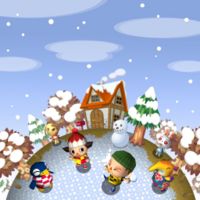Portal: Animal Crossing

| |
| Animal Crossing | |
| Developer | Nintendo |
| Games | Games in the Animal Crossing series |
| Debut | Animal Forest (2001) |
Animal Crossing (known in Japan as Doubutsu no Mori, which translates to Animal Forest) is a series of games that fall into the simulation category. The basic premise consists of interacting with animal villagers in a town while collecting items that can be used to decorate the player's house. The internal clock featured in the games allows changes during gameplay, from day to night and from season to season. Some activities are also schedule based. Connectivity among players is strongly encouraged through methods of visiting other players' towns, and the titles are designed to provide countless replay value.
History[edit]
The series' early history consists mostly of the various versions of the first game, most of which were released only in Japan. It started when the original Doubutsu no Mori was released for the Nintendo 64 in April 2001. However, as the Nintendo 64 was at the end of its lifespan, it was decided to rerelease the game for the Gamecube just months later as Doubutsu no Mori +. This is the game that was released internationally as Animal Crossing and where the series gained popularity. Animal Crossing featured tweaks and changes from the Nintendo 64 game, with the most notable being a system based on the Gamecube's internal clock, which allowed the game to keep track of the date and time for events. The American translation also added new text and special holidays as well as e-Reader connectivity. Nintendo was impressed enough by Nintendo of America's work that the American version of Animal Crossing was retranslated to Japanese and released as the final version of the first Animal Crossing game, which was known as Doubutsu no Mori e+.
There have been several follow-up games in the following years, although the original follow-up (Animal Crossing 2) was cancelled before completion. In 2005, Animal Crossing: Wild World was released for the Nintendo DS. The first handheld installment, this game expanded various features from the first game which adding new ones, and it most notably implemented the Nintendo Wi-Fi Connection. This was followed by Animal Crossing: City Folk, which was released for the Nintendo Wii in 2008. City Folk added some more features such as the titular city and brought the Wi-Fi to the console. This installment also featured and was packaged with the Wii Speak accessory, which acted as a microphone for players to communicate through. The next Animal Crossing game was Animal Crossing: New Leaf for the Nintendo 3DS in 2012/2013. This installment tweaked the normal formula by having the player's character act as the town's mayor.
Since then, there have been two spin-off games released in 2015: Animal Crossing: Happy Home Designer for the 3DS and Animal Crossing: Amiibo Festival for the Wii U. There was also a mobile game called Animal Crossing: Pocket Camp which went live in 2017.
The main series would later continue in 2020 with Animal Crossing: New Horizons for the Nintendo Switch. This one involved building civilizations on a deserted island and became massively popular.
Spin-Offs/Crossovers[edit]
The Animal Crossing series has been represented in most games of the Super Smash Bros. series. There were initially several trophies from the series in Super Smash Bros. Melee, and then in Super Smash Bros. Brawl, it was also represented in the form of a stage (known as Smashville) and the appearance of Mr. Resetti as an Assist Trophy. Super Smash Bros. for Nintendo 3DS/Wii U then introduced the Villager as a playable character, Isabelle as an Assist Trophy and several items derived from the Animal Crossing series. Isabelle would later become a playable fighter in Super Smash Bros. Ultimate.
Other Media[edit]
An anime movie simply known as Doubutsu no Mori was made in 2006. It was based primarily on the scenario of Wild World and featured a female player character named Ai as well as most of the game's animals. The plot follows Ai fitting in with the village as well as a UFO encounter. The movie was only released in Japan and has yet to have any kind of localization to America or Europe.